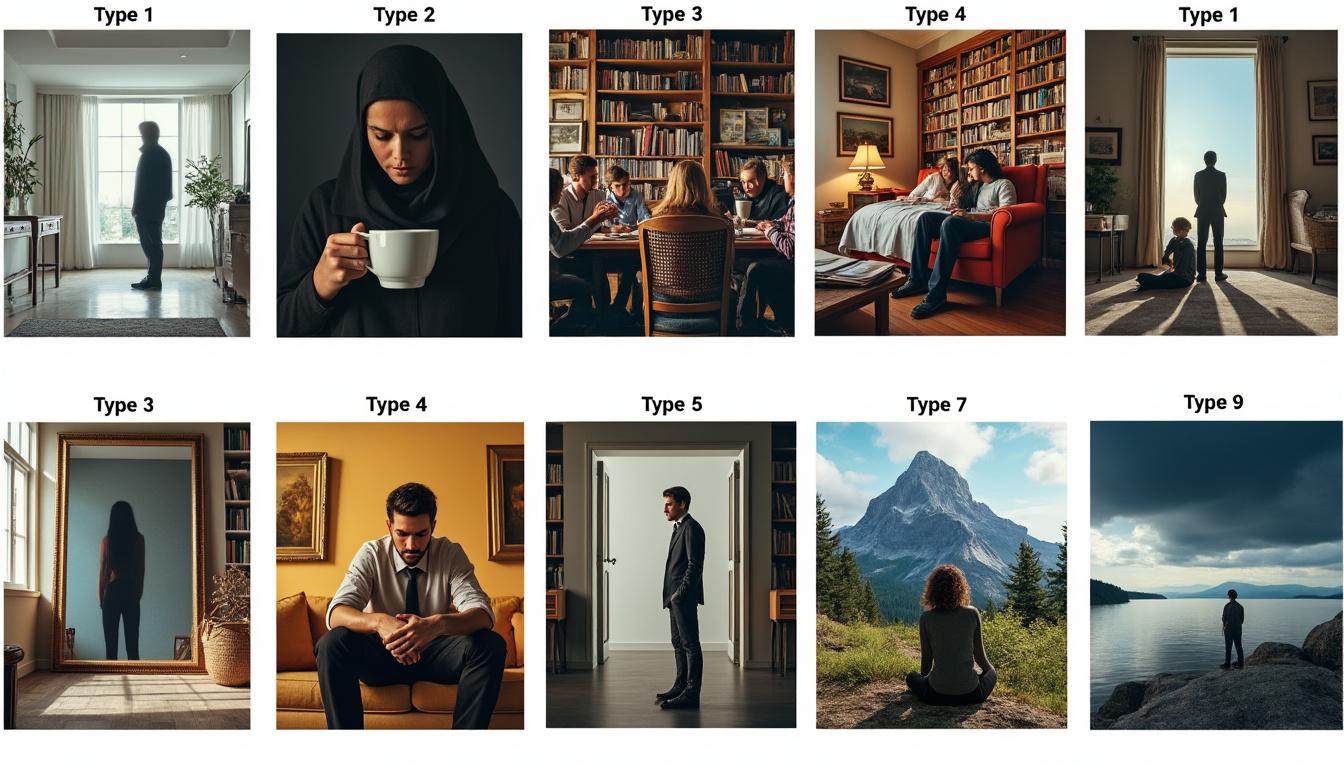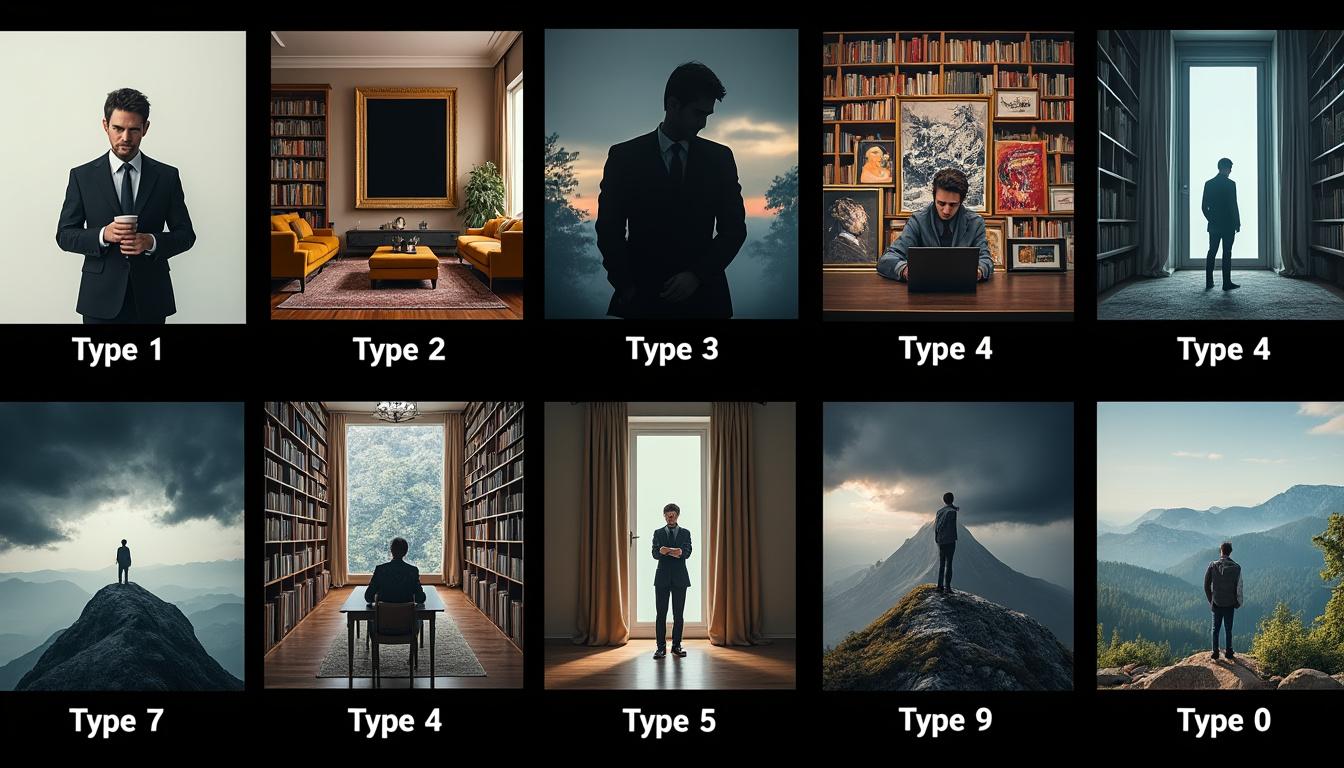Regrets are an integral part of the human experience. Each of us has moments we wish we could relive differently. However, the specific choices that leave us with a deep sense of regret often depend on our unique personality traits.
Reflecting on our mistakes and missed opportunities may seem uncomfortable, but it can also reveal the barriers we impose on ourselves and guide us towards decisions we will be proud of. Understanding these regrets according to each Enneagram type offers an inspiring perspective on our personal journeys. Each type has a distinct tendency that influences the decisions they regret the most. By exploring these choices, we can better understand ourselves and evolve towards a more fulfilling life. This introspective journey invites us to embrace our imperfections and transform our regrets into opportunities for growth. So, let us discover together the choices that each Enneagram type forever regrets.

Each Enneagram type is associated with a specific decision that may haunt them throughout their lives. This decision reflects the deep motivations and intrinsic fears of each type. For example, Type Ones may regret having been too critical of others in their pursuit of perfection. Type Twos, oriented towards altruism, might regret saying “yes” when they should have said “no”, thus neglecting their own needs. Type Threes, focused on success and image, may regret having sacrificed their authenticity to achieve their goals. Type Fours might regret not having seized opportunities for connection out of fear of not being understood. Each type, from Type Fives to Nines, has its own regrets related to choices that have influenced their personal growth and relationships. Understanding these decisions allows for a better grasp of the internal dynamics and promotes harmonious personal development.

“`html
Regrets are an inevitable component of the human experience. Each of us has moments when we wish we had acted differently. However, the specific choices that leave us feeling regret often depend on our unique personality traits. The Enneagram, a personality model comprising nine types, offers a profound perspective on the decisions that each type is likely to regret. Understanding these regrets can guide us towards choices that are more aligned with our values and aspirations. This article explores the definitive decisions that haunt each type of the Enneagram, providing insights for enriching introspection and personal growth.
One type: Being too hard on others
Individuals of type One often regret having been too demanding of others in their quest for perfection. Whether it is being harsh with a romantic partner, constantly criticizing their friends, or pushing their subordinates beyond reasonable limits at work, their intention for improvement can end up alienating those they wish to help. This self-reflection leads them to recognize that, despite good intentions, they may have inadvertently harmed their relationships. Moreover, Ones are also faced with the regret of not having taken the time to simply enjoy life, due to their incessant quest for perfection. For those looking to deepen their understanding of decision-making and innovation, it is worthwhile to consult resources on decision-making and innovation.
Two type: Saying “yes” when they should say “no”
Individuals of type Two often regret having accepted responsibilities or commitments that they should not have. Whether it involves taking on extra tasks at work to please a supervisor, agreeing to attend unwanted events, or choosing restaurants they do not like to satisfy a friend, these decisions come at a high cost to them. Every required “yes” places others’ needs before their own, leading to a gradual sidelining of their own desires. This accumulation of compromises can leave Twos feeling that their lives are incomplete, questioning their role and personal happiness. To better manage these situations, exploring the art of delegation can be beneficial.
Three type: Seeking to appear rather than feel good
Individuals of type Three often regret having pursued success and image at the expense of their authenticity. Whether it is choosing a career that provides prestige but does not deeply fulfill them, remaining in a superficial relationship for appearances, or seeking constant external validation, these decisions can lead to a disconnection from their true selves. Over time, they realize that admiration and applause are fleeting and require constant effort to obtain, often at the expense of their well-being. This realization can prompt them to re-evaluate their priorities and seek greater authenticity in their lives. To boost their careers while remaining authentic, effective decision-making strategies can be explored.
Four type: Not taking risks
Individuals of type Four often regret not having taken enough risks in their relationships and opportunities. Fearing not being understood or accepted, they may refuse invitations, withdraw from romantic relationships, or leave promising situations too early. These choices deprive them of many opportunities for happiness, love, and authentic connection. In contemplation, they realize how many beautiful chances they have missed not due to a lack of opportunities, but due to a lack of willingness to fully seize them. Understanding the importance of communication and balanced decision-making can help Fours overcome these regrets.
Five type: Choosing independence at the expense of connection
Individuals of type Five often regret having isolated themselves too much to prioritize their independence and self-sufficiency. Whether it involves settling in a remote place to focus on their intellectual passions or continually declining invitations, this tendency to withdraw can distance them from meaningful relationships. While this withdrawal allows them to achieve great things through focus, the true regret arises when they find themselves without partners or friends to share their successes and relaxation moments. To find a balance, it is helpful for Fives to learn the importance of human connection in decision-making.
Six type: Playing it too safe
Individuals of type Six often regret having clung too tightly to what seems safe and familiar. This may manifest as staying in jobs or relationships that no longer satisfy them, or refusing opportunities that involve some risk. This excessive caution can hinder their personal growth and happiness. Over time, they understand that this conservative approach has limited their accomplishments and prevented them from living fully. Working on risk tolerance and self-confidence is essential for Sixes to avoid getting stuck in static patterns.
Seven type: Having too much fun
Individuals of type Seven often regret having sought too hard to avoid pain and constantly seek pleasure, which has sometimes led them to problematic situations. Whether it is neglecting important commitments in pursuit of new excitements or making impulsive decisions without considering the consequences, this incessant quest for stimulation can lead to a paradoxically duller life. Eventually, they realize that this frantic pursuit of immediate happiness has distanced them from enriching relationships and experiences. To find balance, Sevens can benefit from strategies for thoughtful decision-making.
Eight type: Hiding their heart
Individuals of type Eights often regret having hidden their emotions and not opening themselves to vulnerability. Their desire to appear strong and independent can prevent them from asking for help or sharing their authentic feelings, thereby limiting their deep relationships. This closed-off stance creates a barrier between them and others, preventing them from receiving the support and intimacy they could have. Over time, they realize that true strength also lies in the ability to be vulnerable and allow others to support them. Learning to delegate and trust can help Eights overcome this regret.
Nine type: Letting life pass by
Individuals of type Nine often regret not having made enough decisions, thus allowing life to lead them rather than acting proactively. Their tendency to avoid conflict and seek peace prompts them to not express their personal truths or to remain in unsatisfactory situations. As a result, they may find themselves regretting missed opportunities and unrealized dreams, not due to inability, but due to passivity. For Nines, it is crucial to develop the ability to take initiative and clearly define their own goals. Effective decision-making strategies can help them regain control of their lives.
Understanding the specific regrets of each Enneagram type allows for deep introspection and better management of future decisions. By recognizing the patterns of choices that lead to disappointment, one can work to align their actions with their authentic aspirations. Whether it is learning to delegate, accepting vulnerability, or balancing pleasure and responsibility, these realizations offer a pathway to a more fulfilling and harmonious life. Adopting effective decision-making strategies and developing a better self-understanding are key steps in transforming past regrets into future growth opportunities.

“`html
FAQ
Q: What is the main regret of Type One in the Enneagram?
A: Type Ones often regret having been too demanding of others, imposing high standards in the name of improvement and perfection.
Q: What regret frequently affects Type Twos in the Enneagram?
A: Type Twos typically regret saying “yes” when they should have said “no“, thus sacrificing their own needs to satisfy those of others.
Q: What decision do Type Threes in the Enneagram regret the most?
A: Type Threes often regret prioritizing image and success at the expense of their authenticity and true personal fulfillment.
Q: What is the common regret among Type Fours in the Enneagram?
A: Type Fours frequently regret not having taken risks and withdrawing from opportunities out of fear of not being understood or accepted.
Q: What type of decision are Type Fives in the Enneagram particularly regretful of?
A: Type Fives often regret having chosen excessive independence at the expense of human connections and meaningful relationships.
Q: What is the greatest source of regret for Type Sixes in the Enneagram?
A: Type Sixes generally regret having played too cautiously, remaining in safe situations but thus limiting their growth and happiness.
Q: What regret do Type Sevens in the Enneagram express most often?
A: Type Sevens often regret having pursued too many pleasures and avoided pain, which has sometimes led them to miss deeper and more meaningful aspects of life.
Q: What type of decisions do Type Eights in the Enneagram frequently regret?
A: Type Eights often regret having masked their emotions and not allowing for deeper connections in wanting to appear strong and independent.
Q: What is the main regret of Type Nines in the Enneagram?
A: Type Nines generally regret not having made active decisions and allowing themselves to be carried along, thus missing opportunities to realize their dreams and desires.












